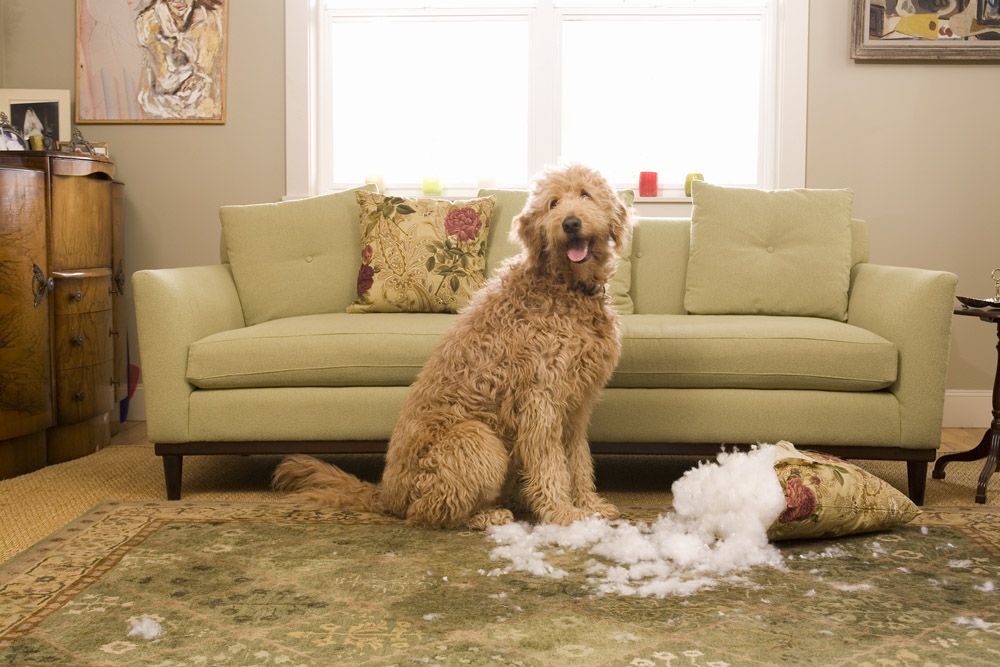
“Is your dog running your household? Has it created chaos and division within your family or with a roommate? Has your spouse or partner said, “It’s Either Me, or The Dog!!?” Then it is time to teach your dog some manners.
Most dog owners have experienced the reluctant friend who is afraid of dogs, or the cautious bystander when walking their dog down the street. But what happens when your housemates don’t like your furry friend? Dogs are known to be man’s best friend. They are loyal, forgiving, non-judgmental, and in many cases useful.
According to the documentary “In the Womb of Dogs,” which aired on the National Geographic Channel, the gray wolf evolved into man’s best friend about 15,000 years ago. The early humans are credited with domesticating the wolf into what we know today as dogs. Now, they are the most diverse species on earth. We have trained dogs to be hunters, therapy dogs, bomb sniffing police dogs, herders, companions and now they are using dogs to identify early stages of various diseases in people. If a dog can be taught to do all of that, why is Fido wrecking havoc in some households? As a dog lover, it was important for me to write about a subject more closely related to my current experience and to help people with their troubled dogs in hopes of making their living situation peaceful.
When I got a new puppy named, Harvard, an Australian Shepherd “Aussie” from a top breeder, he was welcomed into his new home with a menagerie of playful pets. This Aussie was the pick of the litter and had an amazing pedigree. However, what I learned in a short period of time was that his genetics could only go so far. The rest was up to me. I was given detailed instructions on his care, from the proper diet to specific training techniques, as well as how to socialize him.
I became the ultimate puppy “soccer mom” as I enrolled Harvard in not one, but two agility classes, along with his weekly obedience school training, not to mention multiple play dates with other dogs to learn how to socialize. Despite my efforts, Harvard still had a destructive puppy side to him – he still tore up the pillows on my couch, barked aggressively at passerbys, and made my friends so nervous that they refused to visit our home. As much as I loved my new boy, I needed to get a handle on his behavior quick before I lost my mind. I called his breeder, Dr. Christie Cotton of IndigoMoon Aussies, who is also a handler and trainer. I let her know that despite all my efforts, Harvard seemed to be regressing.
Dr. Cotton told me that as with toddlers, puppies need a lot of patience and love. You can’t expect a puppy’s behavior to change overnight. “Harvard is not old enough to control his impulses,” she said. “And just as you wouldn’t expect an eight month old child to be toilet trained, you need to keep in mind your dog is four months old.” She suggested I focus my training with Harvard to tasks I knew he could accomplish in order to create an atmosphere of positive reinforcement. In other words, don’t overwhelm Harvard with too many training sessions. “His mind is mush right now,” she said, noting that I had overscheduled his training. “Keep the training sessions 5-10 minutes a few times a day,” she said. “Always end on a good note.”
But what if Harvard continued to destroy my house? I told Dr. Cotton how I was constantly shouting at my dog whenever he tore up my sheets or knocked over a lamp. She said scolding your dog all the time is counter-productive. “Do not try to force him to stop by scolding him or hollering over and over as that does nothing but prove to your dog that he is bad,” she said. “He learns to tune you out.”
She advised more tactile methods to discipline my puppy. “When saying ‘enough’ isn’t keeping your dog from treating your house like the wild wild West and knocking things over, go over to your dog and put your hands on him,” she said. “Touching your dog signals a brain change and switches up the energy.” The physical action of gently but firmly placing my hands on my dog would help to calm him down long enough to listen to me, she explained. “As you put your hands on him, say in a stern tone, ‘ENOUGH.’”
Rambunctious puppies need lots of confidence in order to train them to be more disciplined. For puppies under one year of age, Dr. Cotton says the key to successful obedience training is to keep your expectations low and take your time. Don’t overwhelm the puppy with too many obedience lessons at once. A little goes a long way.
Dr. Christie Cotton is a Breeder, handler and trainer of Australian Shepherds. She is the owner operator of IndigoMoon Aussies (www.indigomoonaussies.com). She offers these tips to keep a household in order, family and friends happy, while loving our furry companions.
Tip One:
To have a successful relationship with friends and family who either visit or live with you and your dog, you must respect their feelings and be willing to compromise. If possible, make areas in your home available that are free from the invasion of a frisky doggie. Teach your dog manners and be a considerate hostess.
Tip Two:
Since some dogs have a tendency to be noisy and playful, tuning it out and turning a blind eye is not helpful. In that situation, crating a dog or puppy for a few hours is certainly worth your family and friend’s peace of mind. Creating boundaries and tailoring them to meet your family’s needs show respect and will increase the love shared with your dogs.
Tip Three:
But what if you can’t “dogproof” your guest? For example, if a guest in your home is simply not an “animal person” and you have done all you can to keep your dog’s unwanted attention away from them, sometimes honesty is the best policy. To ease the tension and stress, make sure you communicate openly with your guest. Dr. Cotton says sometimes you must set your own boundaries by informing your guest, “This is my home and this is my dog’s home. You are welcome to stay the entire visit, or you can leave.”
When all else fails, seek professional help and intervention. Just as counselors can help families sort through expectations, so can a dog trainer help you and your family work to achieve balance and harmony. Sometimes we are unaware of the effects our animals can have on the peace of mind of our family and friends. We should always teach our dogs to conform to OUR life with respect, compromise and good training; we can all learn to live together in harmony.

